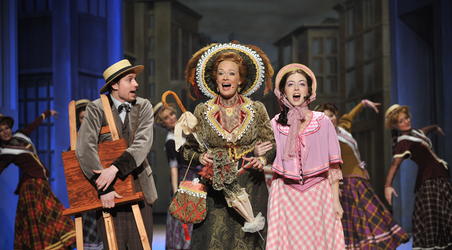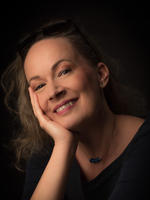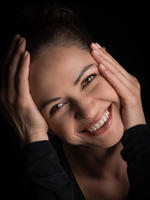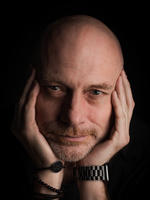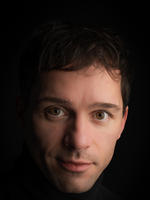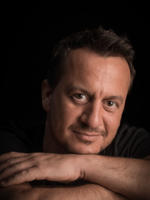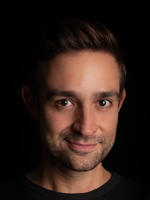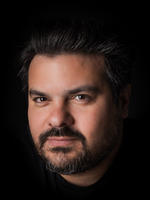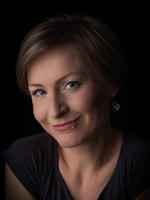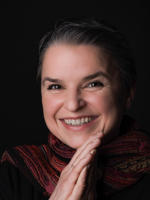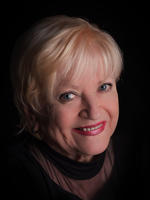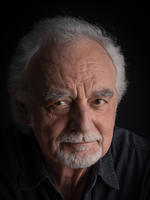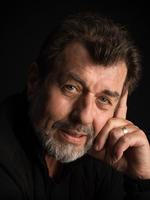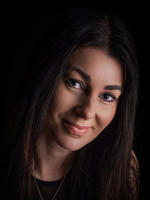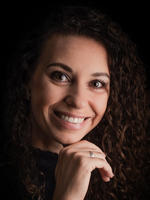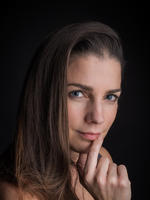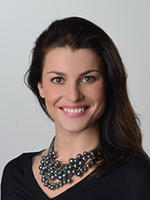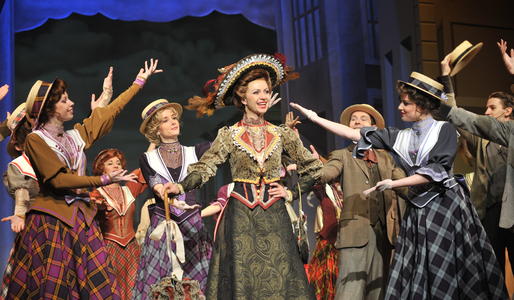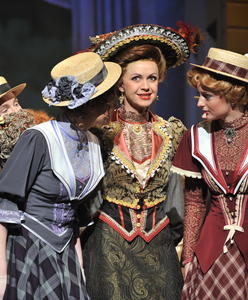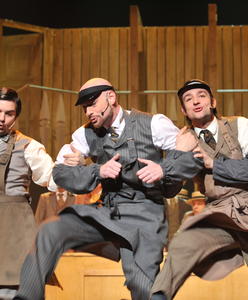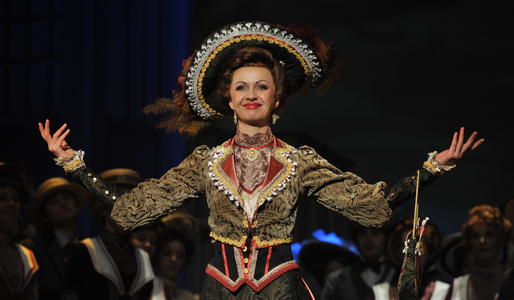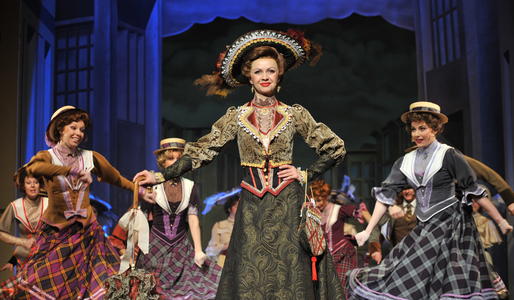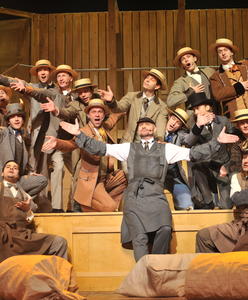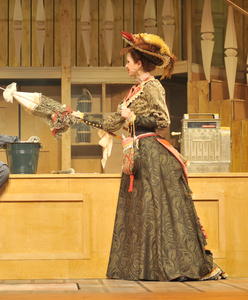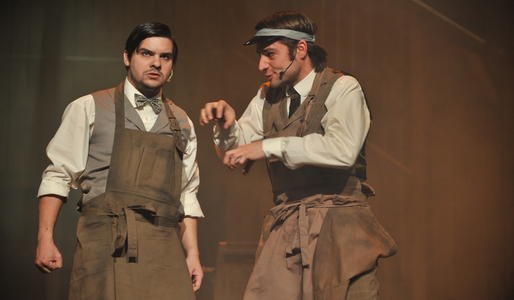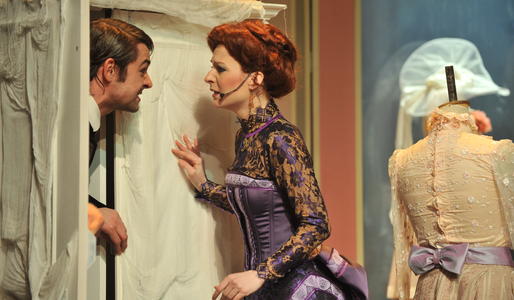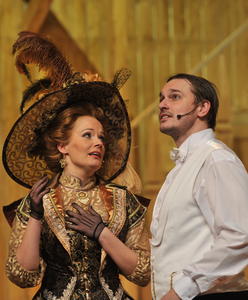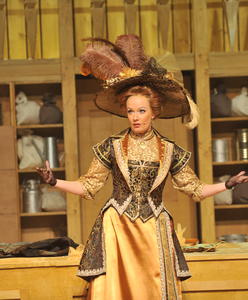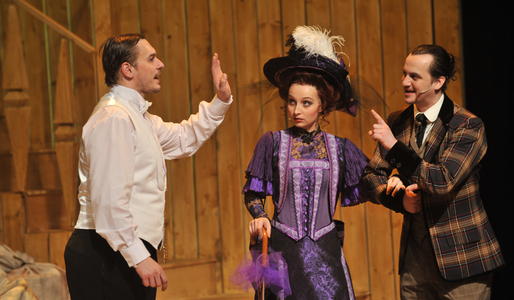Goodbye to operetta cliché
Patrik Fridrichovský 9. March 2010 zdroj Divadelní noviny
Theatre-goers who regularly attend “Brno’s musical dream factory” have been spoilt by Les Misérables, Evita and Spring Awakening, and their latest production, Hello, Dolly!, may seem to be to be a less impressive and older relative in comparison to these works. And yet if not a single spectator desired to see a single musical ever again, and no other musical was written for the next hundred years, matchmaker Dolly would still remain one of the brightest stars forever. This production fortifies the more traditional element of their repertoire, that which lies within the competence of the part of the ensemble with its roots in operetta, in contrast with the hot new musical pieces. The art manager, Igor Ondříček, has been cooperating on classic titles with Gustav Skála on a long-term basis (at Brno City Theatre these are, for example, Orpheus in the Underworld and Mam’zelle Nitouche). The intention was most likely to stage a traditional piece which would fully demonstrate the qualities of an ensemble which can already reach far higher.
Generally, the production is nothing less than a fine piece of workmanship. The real strength of the Brno ensemble lies particularly in places where the direction works with choral scenes. In recent years, whenever I’ve seen this musical in our country it has been dragged down by a very tired choir-operetta routine. The Brno theatre company, however, uses the musical speech of today in the real sense of word – the individual characterization of small figures from the choir, and yet uniform and well-coordinated crowd scenes. At some points I caught myself comparing these “images” with the typical “Mackintosh-style’’ productions of London’s West End rather than with contemporary Czech reality. The stage by Martin Černý may have been simple, but particularly, again (!), the costumes by Roman Šolc were excellent. All this can be praised highly.
However, for a musical of this type, several things are of great importance: The first task is to have a good musical production. Conductor Jiří Petrdlík should fill the sound of the orchestra of this otherwise solid production with more brightness and mainly improve the dynamism of the brass passages. The second, and substantially harder, task was to find suitable actors for Dolly and Horace. Here, director Skála took a different approach to that which is customary and selected actors who are a few years younger than is usual in the Czech Republic. The choice of Alena Antalová for the title role is related to the fact that Dolly Levi isn’t completely a comedy character. Antalová characterizes the talkative match-maker using less visibly grandiose and in fact rather intimate means (as far as singing and particularly acting are concerned), with a dose of acceptable sentiment.
Several difficult aspects in the form of “sub-genre” acting techniques, such as, for example, her witty monologues with the late Ephraim written in the tradition of Anglo-Saxon “stand up” comedy sound subtle and not as puffed up as is usual for Dolly, who is usually played in this way out of habit, rather than due to the logic of the story. The new interpretation evokes a wave of gentle emotions rather than laughter. Igor Ondříček was handed a far more difficult task with the character of Horace Vandergelder, a real acting challenge. Horace, embittered by life, has changed into a rather egoistic dandy, of course without any understanding for the prodigality and excesses of others.
The wellspring of the production is mainly the parts featuring the characters Barnaby (Vojtěch Blahuta) and Cornelius (Aleš Slanina). During their “young comic” trip in which they head off to see the famed whale in the big world of New York and end up in Irene Molloy’s salon (Irene performed by the likable actress Ivana Skálová), situational comedy in the style of crazy French films pushes itself very unexpectedly into the musical. The gags, which go a bit far sometimes, are acted in a very witty way, and these are the moments when the musical hits the best tempo. In fact, the tempo-rhythm of the production is almost surprisingly “musical-drama” like. The climax usually is, how else, the ceremonial and often almost purposeless entrée of Dolly at the Harmonia Garden restaurant.
One of the main fruits borne by the production is probably the interpretational shifts it contains, moving the work from an operetta cliché towards the rhythm of comedy. As was already said, Brno’s Hello Dolly” is certainly what can be considered a pleasant, classic musical for a spoilt audience (after all, they have produced such an audience in Brno over the last few years). The creators know very well what is what in the genre these days, so they can afford to put on such a show with their well equipped and trained “broad-spectrum” ensemble.
Brno’s “Hello Dolly!” – a musical classic in an extremely entertaining guise
Ondřej Doubrava 17. February 2010 zdroj musical.cz
Regular visitors to Brno City Theatre certainly connect Gustav Skála with the direction of irresistible comedies (“A Flea in Her Ear”, “Charley’s Aunt”) and the distinctive, yet comprehensible adaptations of the classic operettas “Orpheus in the Underworld” and “Mam’zelle Nitouche”, with which he can perhaps address all generations. He has encountered “Dolly” several times already.
It needs to be mentioned that Brno City Theatre deserve an imaginary (but really big) A grade for the subject “work with the actors” in “Hello, Dolly!” The promised good dramatic and purely comedic base bore fruit, and the web of relationships between the characters, as expressed in the libretto, became attractive despite its lasting naivety. And when a sense of the grotesque and craziness is added to it, plus a few good creative ideas (e.g. a silhouette of a judge with Zdeněk Junák’s voice), the spectators are getting what they paid for. It is true, however, that certain painful situations are stretched for far too long, but ninety-nine per cent of spectators will enjoy these intensive jokes.
As soon as the title was announced, it was taken as Alena Antalová’s “comeback” from maternal duties to the stage. She equipped her omnipresent Dolly with a great deal of energy, self-confidence as well as an enlightened perspective, and the result is that you believe every word the heroine says in situations both jolly and moving. Or should I say, you don’t merely believe her, you follow everything she says with great enthusiasm.
Let’s also have a look the businessman, Horace Vandergelder. His character should be that of an unpleasant, morose person, but in the distinctive and really great performance by Igor Ondříček he seems completely different. He is, at heart, a very pleasant person with whom particularly the male part of the audience can easily identify, and his behaviour can make them smile as they recognise themselves in him.
Ivana Skálová also puts on a brilliant performance as the lonely hat maker Irene Molloy. Even though she is somewhat younger than the prescribed character, she performed the character absolutely exactly as far as singing and acting are concerned, and she ironed out the age difference easily.
The two shop assistants make a well-coordinated duo. Cornelius Hackel was acted by Aleš Slanina. He could be described as one of the main motors of the performance, alongside Alena Antalová, thanks to his versatility in all the important areas, and his interpretations of the famous hits “Put On Your Sunday Clothes“ and “It Only Takes A Moment“ have all that is needed – elegance, feeling, energy and the joy of acting. The highly naïve Barnaby Tucker suits Vojtěch Blahuta well, and he certainly doesn’t get lost amongst the situational gags; his name has become one that can attract spectators to future performances at the theatre…
Mária Lalková stars as Irene’s friend Minnie - a small, yet distinct role, thanks to her wildness. And if fits of laughter are what you want, simply send some dynamite onto the stage in the form of Zdena Herfortová as the mad Ernestina Money, and the audience will go crazy!
However, let’s get back to the “upholstery”, the most distinct part of which is probably the stage by Martin Černý, which has left perhaps too much in the traditional style. The company fills the view of New York streets with stylish choreography (developed by the director), Horace’s shop is practical and yet cosy, and Irene’s pinkish hat shop is similar, though the famous restaurant Harmonia Garden could certainly do with a little more modernity in its conception or “look”. The costumes by Roman Šolc once again do not lack richness and are easy on the eye, but this time they also have a certain charm (mainly in the case of the men’s). And the music production? With Jiří Petrdlík (and Dan Kalousek) it must be said, again, that they handled the demanding score excellently, and the piece literally swings at times.
The exceptionally well-done “small” programme for the performance also needs to be mentioned. It is actually only small as far as size is concerned, as it contains a lot of interesting information which describes the creation of “Dolly”, and also in its way the development of the classic musical and the history of the production of this piece.
The previous lines can be abbreviated into one paraphrase of the most famous song: It seems that Dolly Levi will not be leaving Brno City Theatre for a long time, because it is an unrestrained performance which is very popular with the spectators without showing signs of pandering to them. Even those who aren’t too keen on this piece should like it, and this is what makes this production particularly special. It will simply attract a new audience.
Dolly in Brno, contemporary and old-style
Luboš Mareček 8. February 2010 zdroj MF Dnes
Director Gustav Skála has made sure this famous musical is no dusty antique
Skála’s Dolly is balanced in all aspects. In other words – this new Brno production has high-quality acting and singing, and the music flows as smoothly as the choreographic numbers. Also awaiting theatregoers are the beautiful costumes by Roman Šolc and the stage by Martin Černý, which can be described as sometimes simple and sometimes highly impressive. The streets of New York look like they do in period postcards, while the scene from the restaurant Harmonia Garden is all impressive pomp with its glowing green curtains.
This elegance is rooted, both period-wise and artistically, in old-time Art Nouveau grace. The musical Hello, Dolly! greatly depends on the performance of the main protagonist – playing this main character is the dream of all mature actresses and singers. Brno’s Dolly isn’t even forty years old in Alena Antalová’s version (let’s remember that Streisand was only twenty-seven in the timeless film), but this doesn’t spoil the piece. Antalová in the role of Dolly Levi is a protective shield which prevents this piece from slipping into touching kitsch or empty sentiment. In her ever-present prudence, she is a woman whose inner loneliness is believable, as is the cunningness with which she outwits her chosen one, Horace Vendelgelder.
Igor Ondříček doesn’t merely act this rich businessman as a comic look at a stupid man who is keen to get married. In the end, he transforms into a sensitive widower who wants to find the woman of his heart again. In fact, the topic of widowhood and loneliness also appears in the character of Irene Molloy, who is played excellently by Ivana Skálová – and this topic keeps appearing throughout the production. The piece also brings up the comic nature of inexperienced youth in the form of the silly duo of shop assistants, Hackel and Tucker (Jakub Przebinda and Vojtěch Blahuta).
Brno’s new Hello Dolly! is modern, even though visually it appears traditional. Despite the sentiment for past times, it fills the audience with the happiness of musical theatre, and this is what makes it modern, lively and attractively contemporary.
A musical built on a solid drama
Michal Novák 7. February 2010 zdroj i-divadlo.cz
This production of a musical phenomenon with the name of the world’s most famous match-maker in the title is the twenty-second domestic production at Brno City Theatre’s Music Theatre. Popularity with spectators, and thus also operational success, is almost guaranteed for every production of the musical Hello, Dolly! This dramaturgical bet on certainty usually comes off – why is this so? This touching story about people who manage to raise themselves from the dust of their life’s journey and follow their dreams will always be close to spectators because they may see a simile to their own lives within it, or perhaps find hope. Last but not least, Hello, Dolly! is part of the golden heritage of classic musical theatre and is full of immortal melodies from genres which take the viewers back to the exciting domain of operetta, swing and the beginnings of musical theatre. The period context brings a scent of old-world elegance and so presents the risk, beautiful for the theatregoer and yet treacherous for a modern theatre, that the work might become ensnared in sentimental emotions. The question must thus be: Can Dolly be created in a different way, with something special that hasn’t been tried before, and can something new be found in this theme with its direct story line?
Productions with a long history – and in the case of Hello, Dolly! it is a rich one – will always tend towards that which is clichéd. The creators of the Brno production, director Gustav Skála and dramaturgists Ondřej Šrámek and Jan Šotkovský, do not define new angles on the play, aiming to make full use of all the “clichés”. The result of this seemingly uninventive concept is an interesting retro work which however does away with the dusty layers of manners which the copious productions of this piece have assembled over the years and which probably everyone associates with it. We won’t get into a sentimental mood when watching it. On the contrary, every scene captures the spectators with its theme, stunning choreography and the soft yet strong emphasis on the focus of comic situations. Director Gustav Skála and the great characters dish out large helpings of the joy of musical theatre. A similarly cheeky paradox within the conception (and a great bonus for the whole production) is the fact that this musical is also a perfectly acted drama. The insights into the life stories of the characters bring an unusual tangibility to the whole production. Thus, only the visual aspect remains traditional in the good sense of word - one could say that it is old-fashioned but beautiful, whether it be the modest and yet flamboyant evocation of a New York street “straight out of a period photo” (stage by Martin Černý), or the simply beautiful costumes by Roman Šolc. It is probably impossible to artistically create Hello Dolly! without that period context.
Despite all this, there is one peculiarity in the production - it is the explication of Horace’s “bad dream” after the disturbance he created in Harmony Garden (where he didn’t have money to pay due to his wallet being swapped for another). A dream-like scene of a trial continues with a scene from a prison cell into which Dolly enters as a female warder in order to say Good bye to Horace in the famous song So Long Dearie. There’s no need to add that what happened in the dream is an impulse for a change in Horace’s way of thinking about Dolly. The scene is also a witty departure from the world of luxury which these people enjoy at least from time to time to the ordinary human level of everyday life.
If we are to ask as to the reasons why Brno has such an exclusive standing, at least on a country-wide scale, with its musical productions, one of the reasons is the sheer fact that the altering of demanding parts is taboo here - nothing is made simple for the orchestra or the actors. The use of the original arrangements created for this work, which are known for their difficulty, only confirms this. This return to roots presents the famous Dolly without distortion from the many kinds of transpositions which the work has encountered during all these years. You might then notice, to your surprise, how much more musical rather than operetta there is in Hello, Dolly!, and how the usual tendency at other theatres to deck it out with the frills of operetta doesn’t actually suit it – in fact, neither do the usual false gestures from flat characters in a typical colourful and beautiful set.
Traditionally, the character of Dolly Levi is usually acted by mature actresses, but one shouldn’t forget that, for example, the “film Dolly”, Barbra Streisand, was only twenty-seven at the time of the premiere of the film. As director Skála points out, the dramatic patterns of the libretto will always work no matter what the ages of the actors in the main roles are. The success of the musical Hello, Dolly! depends on one character and one only needs to bring a suitable character to the stage. In the case of Brno City Theatre, Alena Antalová (in alternation with Ivana Vaňková) was a clear choice. This major role represents Antalová’s return to the stage after her maternal duties, and her Dolly Levi could be described with many opulent attributes, starting with a “an on-stage steamroller”. However, at the same time, we are facing a character whose inner loneliness one can really believe. Alena Antalová approaches the character with a verve that seems to continuously eradicate the story’s tendency to become sentimental (and kitschy). She brings a self-confident woman to the stage whose character quickly fills the whole room, as does her cunningness, which amuses the spectators both in comic and more serious scenes. Her opponent, businessman Horace Vandergelder, starts off as an exemplary oaf, then a man thrown off the rails by circumstances, and finally ends up a happy victim of Dolly Levi’s net. For me personally it is the most comic performance of the evening, as Igor Ondříček presents humour arising from situations when the character himself isn’t the source of comedy. The personality expressed in Ondříček’s performance negates the view of Horace as a sulky person (as we have often seen this character) and, in contrast, reinforces the image of an introvert whose sourness is only a protective shell for his own uncertainty. Due to this it is very likely that a great part of the male audience will easily identify with the feelings or acting of the character. Also, the character of the lonely hat-maker Irene Molloy has a very similar functional interaction with the audience. Ivana Skálová mastered this role, for which she perhaps still doesn’t have the right age, in a stunning way, both in the presentation of the charm of this melancholy woman and in her singing parts.
The genial libretto helps in the fight against the “overuse of tissues” in itself by balancing out the pathos via a series of characters that bring direct comedy to the show. Verbal gags are easily supplemented by situational ones, particularly in the case of the well-known characters of the two absent-minded sales assistants Cornelius Hackel (Aleš Slanina) and Barnaby Tucker (Vojtěch Blahuta). Irene’s young friend Minnie supplements her well with her frisky character (Mária Lalková). And if this is too little to make you laugh enough, a weepy creature, Ernestina Money, enters the stage, acted by Zdena Herfortová. An explosion of laughter is guaranteed. Director Gustav Skála also doesn’t hesitate to present small situational episodes for the sake of a good gag. Let’s name the scene with a clumsy paper hanger who comes to Horace Vandergelder’s shop close to the end of the whole play. As a matter of fact, this workman is acted by Aleš Slanina if he isn’t in the role of assistant Hackel that evening. Aleš Slanina’s performance in the “more important” role showed yet again what a universal talent he is and how this young actor can be the motive force of the performance (apart from the actress in the role of Dolly Levi, of course). His perfect mastery of singing, movement and this time even comedy acting is another foundation stone in the mosaic from which the success of the whole production is composed.
As expected, a musical production which is popular with spectators, and which will certainly be popular for a long time, has been created at Brno City Theatre. This happened without a conspiracy with effects, within the bounds of tradition. Even though director Skála has created a modern, unrestrained piece, we can still feel the period atmosphere behind it. The only conflict occurs when the thorough effort to create a full scenographic illusion ceases to correspond with the abstract form of several scenes. There are so many pillars which support this production and it is only up to the spectators which of the ‘pillars’ will address them. It may be the graphic “emotion” of past times, the work put into bringing out fine details in the characters, the dazzling swing tones of this now legendary musical, the impressive choreography displayed by the waiters at Harmonia Garden, the performance of the actors etc. I personally choose the way in which the creators have turned treacherous places in the libretto of this piece into advantages, drawing one’s attention to the timelessness of the work and thus enchanting today’s spectators. The charm which fascinated the first generation of spectators of the musical Hello, Dolly! was not only re-discovered at Brno City Theatre but also carries the work out of the stagnant waters of Czech production tradition and into the realm of modern musical theatre.

